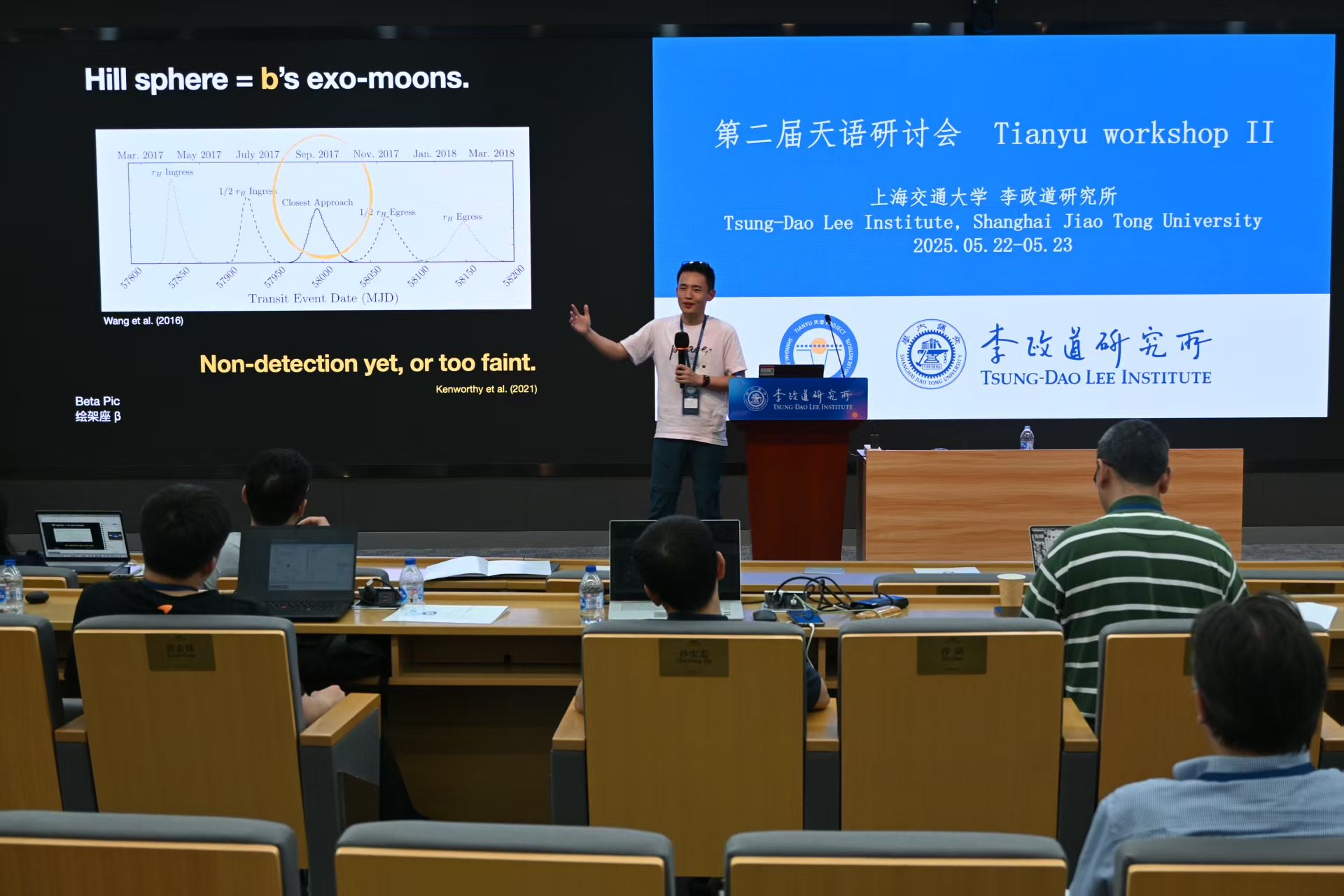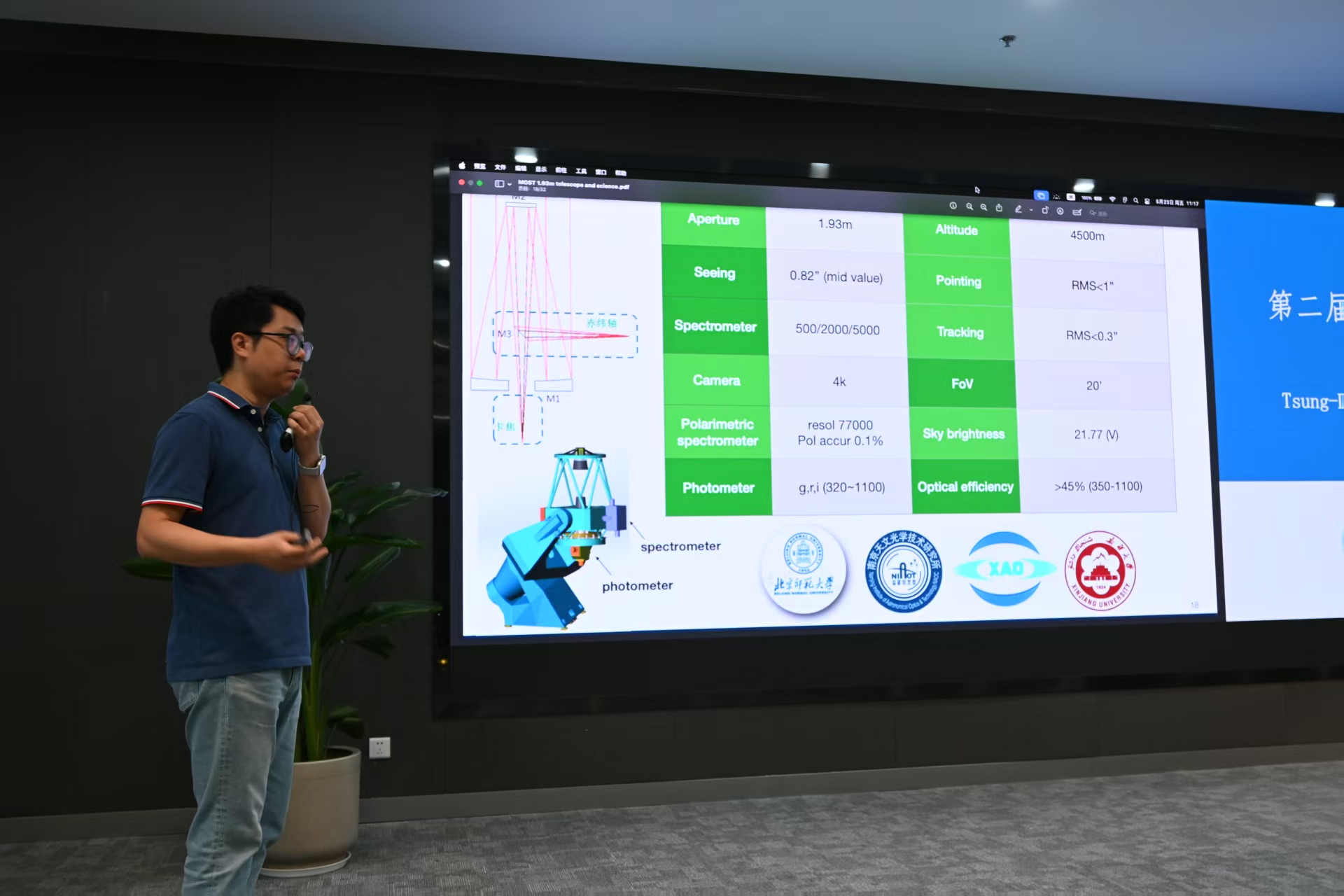On May 22-23, 2025, Shanghai Jiao Tong University’s Tsung-Dao Lee Institute (TDLI) hosted Tianyu Workshop II, a hybrid event gathering 63 researchers from global institutions. Leading experts delivered invited talks on key topics such as time-domain astronomical observations, data processing, and collaborative development of telescope projects.

At the opening session of the workshop, Professor Xiaohu Yang, Deputy Director of TDLI, delivered the welcome address. He provided a brief overview of the development of TDLI Astronomy and Astrophysics Division, as well as SJTU Department of Astronomy under the School of Physics and Astronomy. Professor Yang also introduced the fundamentals of Jiaotong University Spectroscopic Telescope (JUST) and Tianyu Project.
Following this, Fabo Feng, Principal Investigator of Tianyu Project and TDLI Tenure-track Fellow, presented a detailed report on the project’s overall progress and scientific goals. Funded by SJTU, Tianyu Project aims to build at least one 1-meter-class wide-field telescope at Lenghu in Qinghai Province. The project is designed to conduct high-precision photometric monitoring, with a core objective of detecting transit signals from long-period exoplanets. The telescope will also be used to observe various time-domain astronomical phenomena, including supernovae, variable stars, and asteroids.
As a precursor photometric survey for JUST, Tianyu Project will play a critical role in target selection and photometric alert generation, laying a solid data foundation for future observations. The telescope is expected to complete construction and begin commissioning in 2026.
During the workshop, the team also provided a comprehensive overview of the telescope’s hardware deployment plans, data processing pipeline, and the progress of the simulation data platform. These developments offer valuable insights for advancing large-scale observations and maximizing scientific output.


The workshop featured invited talks by several leading experts from China and abroad in the field of time-domain surveys, who shared the latest progress.
Professor Peter Wheatley and Associate Professor Daniel Bayliss from the University of Warwick, UK, introduced the architecture and key achievements of the Next-Generation Transit Survey (NGTS). They also presented recent advances in the detection of long-period exoplanet transits using data from NGTS and TESS. Researchers from Universidad Diego Portales, Observatoire de la Côte d’Azur, the University of Birmingham, and the University of Liege also provided insightful talks.
Experts from prominent Chinese institutions—including the National Astronomical Observatories of the Chinese Academy of Sciences (NAOC), Nanjing University, the University of Science and Technology of China (USTC), Purple Mountain Observatory, Beijing Normal University, and Shanghai Astronomical Observatory—shared updates on major national time-domain survey projects. These included Sitian Project, Mozi Survey Telescope, TiDO Project, Mutian Telescope, and the Antarctic Skygaze Project.
In-depth discussions were held among participants on critical aspects such as telescope hardware deployment, data pipeline development, and the design of scientific objectives. These exchanges fostered cross-project collaboration and mutual learning in both technical implementation and operational experience.
Additionally, the workshop included sessions focused on the scientific applications of data produced by time-domain surveys. Topics covered the frontiers of Astrophysics such as variable star identification and classification using TESS and ZTF data, as well as the analysis of exoplanet transit timing variation (TTV) signals.
The successful convening of the workshop significantly enhanced communication and collaboration between Tianyu Project and other domestic and international time-domain survey initiatives. It also opened new avenues for sharing algorithms and methodologies across projects.




Looking ahead, the Tianyu team will continue to advance the development and refinement of the telescope and its supporting platforms. During the operational phase, the project aims to promote broader data accessibility and algorithmic collaboration. Regular academic exchange activities will also be organized to foster closer ties with the global astronomical community. Through these efforts, Tianyu Project seeks to address cutting-edge scientific questions in time-domain astronomy and contribute to elevating research in this dynamic field to new heights.
Contributors
Article by: Shuyue Zheng, Xiaowei Duan, and Lisha Duan
Proofread by: Yu Zhao
Source: SJTU TDLI
Editor on Duty: Yan Cheng

